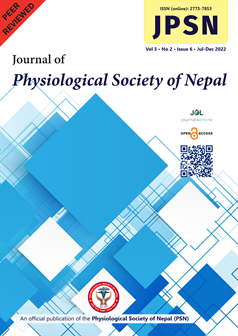Clinical Manifestation of Polycystic Ovarian Syndrome and its Correlation with Thyroid Stimulating Hormone: A Preliminary Observational Study in Eastern India
DOI:
https://doi.org/10.3126/jpsn.v3i2.65285Keywords:
PCOS; menstrual cycle; TSH; estrogen; obesityAbstract
Background : Polycystic ovary syndrome (PCOS) affects 4 to 20% of women in their reproductive age. In younger life PCOS is asymptomatic; however, as the disease progresses, irregular menstruation, hyperandrogenism, and infertility are the eventual outcomes. The aim of this study was to detect PCOS in a relatively young population and find out its correlation with thyroid function.
Methods : A case-controlled observational study was conducted between PCOS (N=17) vs. normal control (N=17) in hospital set up. A through clinical examination, blood examinations (CBC, glucose, TSH, iron, estrogen) and imaging of lower abdomen by ultrasonography (USG) was conducted in all enrolled participants. The PCOS were confirmed according to Rotterdam Consensus Criteria.
Results : The mean age of control women was 23.64 yrs and PCOS was 23.23 yrs. The first menarche age was significantly lowered in PCOS group (p<0.001) and all PCOS participants had irregular periods. Only 29.41% PCOS participants crossed the borderline of normal BMI towards obesity. Hypertensions were not observed in any participants. Significant high difference in blood haemoglobin (p<0.001), TSH (<0.001) and estrogen (<0.001) was resulted in PCOS. Furthermore, inverse correlations between TSH, BMI and estrogen were reported.
Conclusion : The current investigation found a strong link between polycystic ovarian syndrome and subclinical hypothyroidism. Therefore, in order to limit or treat PCOS-related health issues, patients should undergo a thyroid profile screening.
Downloads
Downloads
Published
How to Cite
Issue
Section
License
Copyright (c) 2024 Journal of Physiological Society of Nepal

This work is licensed under a Creative Commons Attribution-NonCommercial 4.0 International License.

